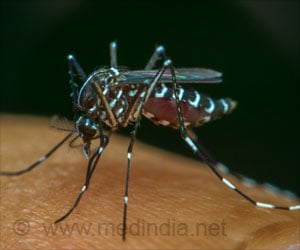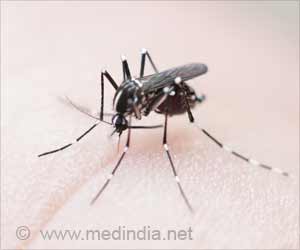Experts from the Pan American Health Organization (PAHO) are working with health authorities in Paraguay to help control an outbreak of dengue fever that has affected a number of communities
Experts from the Pan American Health Organization (PAHO) are working with health authorities in Paraguay to help control an outbreak of dengue fever that has affected a// number of communities throughout the nation and has raised concerns among neighboring countries in South America.
PAHO officials warn that the entire Latin America region needs to take preventive measures to prepare for what promises to be a "difficult year" for dengue.In mid-January, Paraguay declared an epidemiological alert as new cases of dengue began to emerge. On Jan. 20, the first two deaths of the year from dengue hemorrhagic fever were reported. By Feb. 5, a total of 2,967 cases of dengue fever had been reported as well as 18 cases of dengue hemorrhagic fever, including three deaths. Health officials noted that in several of the affected areas, the number of cases so far this year already exceeds the total for 2006.
"Our top priority is treating the people who are affected to prevent more deaths," said Dr. José Luis San Martín, PAHO regional advisor on dengue.
PAHO has sent a team of experts to Paraguay to provide technical assistance in areas including medical treatment, social communication, and health services organization. Health authorities in Paraguay, Argentina, Brazil, and Bolivia have all stepped up prevention in border area, including intensified surveillance and control measures.
"Paraguay has a comprehensive strategy for preventing and controlling dengue and has the ability to respond in an integrated way to this increase in cases," said San Martín, noting that the country had responded effectively to outbreaks in 2006.
Dengue outbreaks in Latin America have followed a cyclical pattern during the past 25 years, according to San Martín. Major outbreaks tend to be separated by periods of three to five years and tend to increase in intensity over time. Data from 2006 combined with current reports and the presence of the weather phenomenon El Niño suggest that "2007 will be a difficult and complex year for responding to dengue," said San Martín. "The situation in the region really goes beyond the health sector and requires the active participation of other sectors and actors as well."
Advertisement
San Martín noted that community efforts are key to preventing or reducing outbreaks of dengue. Dengue is carried by the Aedes aegypti mosquito, which flourishes in areas with poor sanitation and under conditions of high precipitation. "Citizens can play a fundamental role by keeping their homes free of breeding places for the Aedes aegypti mosquito, which carries the disease," said San Martín.
Advertisement
There is currently no vaccine or cure for dengue, which causes high fever, muscular pain, headaches, vomiting, and in some cases skin rash.
Prevention efforts focus on raising public awareness of how the disease is transmitted and getting people to take personal preventive measures, including the use of mosquito repellant, and to eliminate breeding sites such as water storage barrels, potted plants, pet bowls, or any uncovered water container.
The Pan American Health Organization (PAHO) was established in 1902 and is the world's oldest public health organization. It serves as the regional office of the World Health Organization, and works with all the countries of the Americas to improve the health and quality of life of their peoples.
Source-Bio-Bio Technology
SRM










